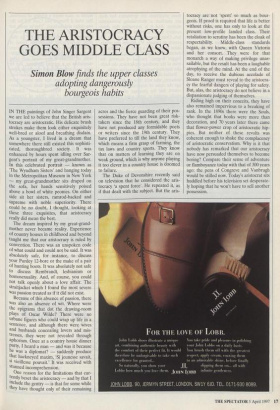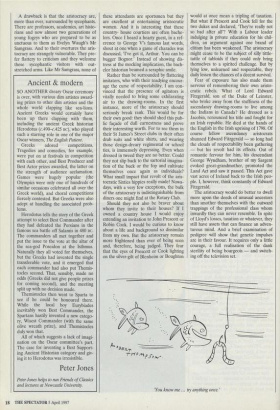THE ARISTOCRACY GOES MIDDLE CLASS
Simon Blow finds the upper classes adopting dangerously bourgeois habits The dream inspired by my great-grand- mother never became reality. Experience of country houses in childhood and beyond taught me that our aristocracy is ruled by convention. There was an unspoken code of what could and could not be said. It was absolutely safe, for instance, to discuss your Purdey 12-bore or the make of a pair of hunting boots. It was absolutely not safe to discuss Rembrandt, lesbianism or homosexuality. And, of course, you could not talk openly about a love affair. The straitjacket which I found the most severe was passion treated as if it did not exist.
Because of this absence of passion, there was also an absence of wit. Where were the epigrams that dot the drawing-room plays of Oscar Wilde? There were no urbane figures who could wrap up life in a sentence, and although there were wives and husbands concealing lovers and mis- tresses, they were not revealed through aphorism. Once at a country house dinner party, I heard a man — and was it because he was a diplomat? — suddenly produce that. hackneyed maxim, 'Si jeunesse savait, si vreillesse pouvait.' It was received with stunned incomprehension. One reason for the limitations that cur- rently beset the aristocracy — and by that I Include the gentry — is that for some while they have thought only of their remaining acres and the fierce guarding of their pos- sessions. They have not been great risk- takers since the 18th century, and they have not produced any formidable poets or writers since the 19th century. They have preferred to till the land they know, which means a firm grasp of farming, the tax laws and country sports. They know that on matters of learning they are on weak ground, which is why anyone playing it too clever in a country house is doomed to failure.
The Duke of Devonshire recently said on television that he considered the aris- tocracy 'a spent force'. He repeated it, as if that dealt with the subject. But the aris- tocracy are .not 'spent' so much as bour- geois. If proof is required that life is better without risks, one has only to look at the present low-profile landed class. Their retaliation to scrutiny has been the cloak of respectability. Middle-class standards began, as we know, with Queen Victoria and her consort. They were for that monarch a way of making privilege unas- sailable, but the result has been a laughable atrophying of the mind. At the end of the day, to receive the dubious accolade of Sloane Ranger must reveal to the aristocra- cy the fearful dangers of playing for safety. But, alas, the aristocracy do not believe in a dispassionate judging of themselves.
Riding high on their conceits, they have also remained impervious to a breaking of rank. In the 1890s there were the Souls, who thought that books were more than decoration, and 70 years later there came that flower-power crop of aristocratic hip- pies. But neither of these revolts was coherent enough to shake the complacency of aristocratic conservatism. Why is it that nobody has remarked that our aristocracy have now persuaded themselves to become boring? Compare their sense of adventure or flamboyance today with that of 300 years ago: the pens of Congreve and Vanbrugh would be stilled now. Today's aristocrat sits huddled before his television set desperate- ly hoping that he won't have to sell another possession. A drawback is that the aristocracy are, more than ever, surrounded by sycophants. There are professors, academics, art histo- rians and now almost two generations of young fogeys who are prepared to be as unctuous to them as Evelyn Waugh's Mr Samgrass. And to their overtures the aris- tocracy are strangely vulnerable. They pre- fer flattery to criticism and they welcome these sycophantic visitors with out- stretched arms. Like Mr Samgrass, none of these attendants are sportsmen but they are excellent at entertaining aristocratic women. And it is interesting that these country- house courtiers are often bache- lors. Once I heard a hearty guest, in a ref- erence to George V's famous last words, shout at one when a game of charades was discussed, 'I've got it, Arthur. You can be bugger Bognor.' Instead of showing dis- tress at the mocking implication, the bach- elor historian beamed a seraphic smile.
Rather than be surrounded by flattering imitators, who with their toadying encour- age the curse of respectability, I am con- vinced that the presence of agitators is vitally needed to bring some exhilarating air to the drawing-rooms. In the first instance, more of the aristocracy should seriously break rank. This would be for their own good: they should shed this pub- lic façade of dull earnestness and prove their interesting worth. For to see them in their St James's Street clubs in their often drab suits and white shirts, and wearing those design-dreary regimental or school ties, is immensely depressing. Even when dressed in tweed they are no better. Could they not slip back to the sartorial imagina- tion of the buck or the fop and cultivate themselves once again as individuals? What small impact that revolt of the aris- tocratic Sixties hippies really made! Nowa- days, with a very few exceptions, the bulk of the aristocracy is indistinguishable from diners one might find at the Rotary Club.
Should they not also be braver about whom they invite to their houses? If I owned a country house I would enjoy extending an invitation to John Prescott or Robin Cook. I would be curious to know about a life and background so dissimilar from my own. But the aristocracy remain more frightened than ever of being seen and, therefore, being judged. They fear that the eyes of Prescott or Cook lighting on the silver-gilt of Blenheim or Boughton would at once mean a tripling of taxation. But what if Prescott and Cook fell for the two dukes and declared, 'They're really not so bad after all'? With a Labour leader indulging in private education for his chil- dren, an argument against one brand of elitism has been weakened. The aristocracy might cease to be the subject of silly tittle- tattle of tabloids if they could only bring themselves to a spirited challenge. But by lying low, unlearned and respectable, they daily lessen the chances of a decent survival.
Fear of exposure has also made them nervous of remembering their own aristo- cratic rebels. What of Lord Edward Fitzgerald, son of the Duke of Leinster, who broke away from the stuffiness of the ascendancy drawing-rooms to live among the Indians in Canada? He dressed as a Jacobin, renounced his title and fought for an Irish republic. He died at the hands of the English in the Irish uprising of 1798. Of course fellow ascendancy aristocrats shunned Edward Fitzgerald — so long had the clouds of respectability been gathering — but his revolt had its effects. Out of romantic fervour for him, his descendant George Wyndham, brother of my Sargent evoked great-grandmother, promoted the Land Act and saw it passed. This Act gave vast acres of Ireland back to the Irish peo- ple. I, however, think constantly of Edward Fitzgerald.
The aristocracy would do better to dwell more upon the deeds of unusual ancestors than smother themselves with the outward trappings of the professional class whom inwardly they can never resemble. In spite of Lloyd's losses, taxation or whatever, they still have assets that can finance an adven- turous mind. And a brief examination of pedigree will show that genetic impulses are in their favour. It requires only a little courage, a full realisation of the dank sterility of being bourgeois — and switch- ing off the television set.
You know me ... ay anything once.'



























































 Previous page
Previous page